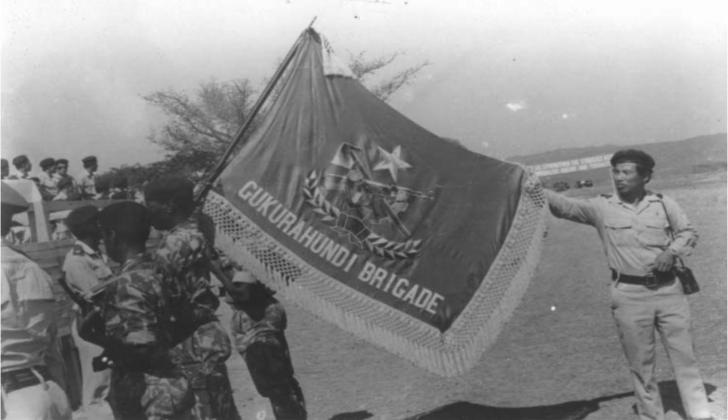Opinion / Book Reviews
Origins of the Gukurahundi philosophy
06 Dec 2024 at 20:06hrs |
336 Views

The philosophy of Gukurahundism, as articulated by George Mkwananzi in FIGHT or PERISH, is rooted in a complex web of ethnic fears, historical grievances, and political ambitions that shaped the trajectory of Zimbabwe's post-colonial politics. According to Mkwananzi, the foundations of Gukurahundism were laid in the 1960s by Shona strategists who harbored deep anxieties about a post-colonial Zimbabwe governed by a Ndebele leader.
This fear, Mkwananzi argues, stemmed from the perceived threat that the Ndebele, with their historical prominence and distinct cultural identity, could dominate a country led by the Shona. The early rifts between political leaders, such as Joshua Nkomo and the breakaway formation of ZANU in 1963, further exacerbated tensions, culminating in the idea of a monolithic, Shona-dominated Zimbabwe.
Mkwananzi details the disproportionate role played by the Ndebele people in the liberation struggle, with their contributions through ZAPU and ZIPRA representing over 60% of the overall effort. This contribution, however, was viewed by the Shona as a threat to their political dominance. The history of Shona collaboration with colonial forces during the 1893 Anglo-Ndebele War only deepened the historical divide, leaving the Shona with lingering fears of being overshadowed by the Ndebele’s proud identity and cultural assertiveness.
The origins of Gukurahundi, then, were not solely political but deeply intertwined with ethnic insecurities and the quest for national unity. Mkwananzi describes how the Shona strategists, fearing the potential for Ndebele political ascendancy, devised a plan to systematically suppress and eliminate Ndebele identity as a significant force in Zimbabwe's politics.
The Gukurahundi strategy, as outlined by Mkwananzi, relied on multiple tactics to weaken the Ndebele people and ensure their marginalization. These tactics included physical violence, ethnically driven selective development, cultural domination, and even sexual warfare aimed at eroding the Ndebele identity. With ZIPRA soldiers disbanded and scattered across the country, the political climate became ripe for the Shona-led government to target the unarmed Ndebele population.
Mkwananzi characterizes the Gukurahundi ideology as a covert, ethno-political strategy that operates under the radar, much like a predator lying in wait for its prey. The "Gukurahundist" philosophy, as he calls it, is a method of ethnic and racial domination that thrives on silence and subterfuge, often hidden beneath official rhetoric or national unity efforts.
The manual for the systematic subjugation of the Ndebele, according to Mkwananzi, follows a well-organized series of steps. These include the fragmentation of Ndebele political unity, the emasculation of their leadership, the deliberate stoking of regional divisions, and the denial of political and economic opportunities to Ndebele people. The ultimate aim, he argues, is to depopulate the Ndebele through both physical and cultural means, outbreed them through intermarriage, and gradually take over their lands, economic opportunities, and political representation.
Mkwananzi concludes with a chilling observation on the effectiveness of this Gukurahundi strategy. Despite the clear patterns of marginalization and violence, the Ndebele people, he laments, have struggled to mount a meaningful resistance. As a result, the Gukurahundi blueprint continues to shape Zimbabwe’s political landscape, with the Ndebele region undergoing a slow, deliberate process of demographic and political transformation aimed at ensuring the Shona remain the dominant force in the country.
This fear, Mkwananzi argues, stemmed from the perceived threat that the Ndebele, with their historical prominence and distinct cultural identity, could dominate a country led by the Shona. The early rifts between political leaders, such as Joshua Nkomo and the breakaway formation of ZANU in 1963, further exacerbated tensions, culminating in the idea of a monolithic, Shona-dominated Zimbabwe.
Mkwananzi details the disproportionate role played by the Ndebele people in the liberation struggle, with their contributions through ZAPU and ZIPRA representing over 60% of the overall effort. This contribution, however, was viewed by the Shona as a threat to their political dominance. The history of Shona collaboration with colonial forces during the 1893 Anglo-Ndebele War only deepened the historical divide, leaving the Shona with lingering fears of being overshadowed by the Ndebele’s proud identity and cultural assertiveness.
The origins of Gukurahundi, then, were not solely political but deeply intertwined with ethnic insecurities and the quest for national unity. Mkwananzi describes how the Shona strategists, fearing the potential for Ndebele political ascendancy, devised a plan to systematically suppress and eliminate Ndebele identity as a significant force in Zimbabwe's politics.
Mkwananzi characterizes the Gukurahundi ideology as a covert, ethno-political strategy that operates under the radar, much like a predator lying in wait for its prey. The "Gukurahundist" philosophy, as he calls it, is a method of ethnic and racial domination that thrives on silence and subterfuge, often hidden beneath official rhetoric or national unity efforts.
The manual for the systematic subjugation of the Ndebele, according to Mkwananzi, follows a well-organized series of steps. These include the fragmentation of Ndebele political unity, the emasculation of their leadership, the deliberate stoking of regional divisions, and the denial of political and economic opportunities to Ndebele people. The ultimate aim, he argues, is to depopulate the Ndebele through both physical and cultural means, outbreed them through intermarriage, and gradually take over their lands, economic opportunities, and political representation.
Mkwananzi concludes with a chilling observation on the effectiveness of this Gukurahundi strategy. Despite the clear patterns of marginalization and violence, the Ndebele people, he laments, have struggled to mount a meaningful resistance. As a result, the Gukurahundi blueprint continues to shape Zimbabwe’s political landscape, with the Ndebele region undergoing a slow, deliberate process of demographic and political transformation aimed at ensuring the Shona remain the dominant force in the country.
Source - byo24news
All articles and letters published on Bulawayo24 have been independently written by members of Bulawayo24's community. The views of users published on Bulawayo24 are therefore their own and do not necessarily represent the views of Bulawayo24. Bulawayo24 editors also reserve the right to edit or delete any and all comments received.
Join the discussion
Loading comments…



























